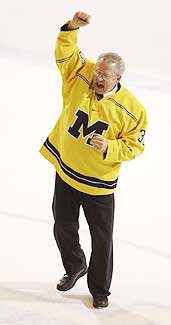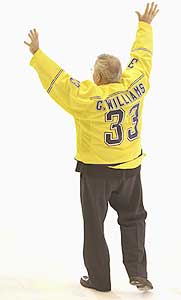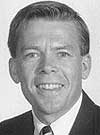The Raves
When Minnesota scored in the final minute of regulation in the NCAA final, sending the game to overtime, my eyes welled up with tears.
They were not tears of sadness over Maine’s plight, nor tears of joy over the Gophers’ new life.
As I sat there watching the crowd go crazy, and Matt Koalska leap into a swarm of Gophers by his bench, it struck me how this tournament never ceases to amaze. It was another beautiful moment for this game.
College hockey seems to have something special going right now. There’s just the right balance between the exploding popularity and the quaint “everyone knows everyone” charm. Its alumni are making major noise in the NHL, and every year, more and more people take notice of that fact.
That the final game ended with controversey — a power-play goal in overtime — only temporarily annoyed me. Sure, you hate to see something like that. But, ultimately, that’s hockey. It’s all part of the game. Much easier said when you’re not a Maine fan, but hey …
A month removed from it all, that fact barely crosses my mind. I can only think of the quality of play on the ice, the quality of the coaching, the spirit of the fans — for the whole tournament. I think of all the storylines: Maine’s memory of its late coach, Shawn Walsh; The non-Minnesotan, Grant Potulny, becoming the hero; the Hobey winner, Jordan Leopold, taking home a national championship after making a tremendously eloquent acceptance speech; Tim Whitehead, the interim coach, winning over the state of Maine; the “Pohl Vault”; the record crowds in the glorious new building; and on it goes.
And even the off day had plenty to shout about.
Friday’s Hobey Baker Award ceremony was fantastic, and it was great to see the Award committee finally get it right. By inviting the three finalists to the event, the whole event has changed infinitely for the better.
In the past, because the winner was known to insiders, and he would have to be present, word would inevitably leak out. Instead, this year, the suspense was palpable, especially because any of the three finalists could make a great case for winning.
Also on Friday, outgoing Wisconsin coach Jeff Sauer was stunned when he was presented with a special Humanitarian Award. They couldn’t have picked a better person.
The hockey world is not going to feel the same without Sauer and fellow long-timer Ron Mason of Michigan State behind the bench next year. But time marches on.
Many fans of their teams believe the game passed those guys by. That two Big 10 schools like Wisconsin and Michigan State should be able to win championships, and that those guys can’t get it done anymore.
Well, who knows. All I know is, it’s not even a point worth debating. These are two great coaches, great ambassadors, and great men that are leaving our sport. This great sport that gives us so many thrills. And they will be missed.
The Rant
Someone will say that this is sounding insensitive to Sept. 11. No, it’s not. I was horrified by those events, like we all were, and they’re still greatly disturbing. But illogical reactions to those events do nothing to honor or dignify their memory.
OK, so this year’s NCAA tournament was “regionalized” and we all lived to talk about it. There was a big outcry about it, the die-hard fans got whipped into a frenzy. But the tournament still amazed us with great play, and we’ll all soon forget about it.
But just don’t let it happen again!
Regionalization — or keeping teams closer to home when bracketing the respective NCAA tournaments — was something the NCAA was trying to stress in all sports for a couple of years as a way to save money. But in the aftermath of the tragic events of last Sept. 11, the NCAA’s Management Council moved quickly to implement an even more strict regionalization plan, feeling a need to limit travel. This was initially done for fall sports, but the plan was renewed for winter sports during the Management Council’s February meetings.
Regionalization is fine for a sport like basketball, which has 64 teams, four regions and numerous conferences. Despite some travel restrictions, first-round matchups against conference opponents can still be easily avoided, and competitive balance maintained, because there are so many options available to the committee.
But the plan causes particular concern for a sport like hockey, which has just two regions and, really, only three (and a half) major conferences.
The two main problems of forcing teams to stay in their “home” region are clear as day: 1) If your two regions have an imbalance in terms of quality teams, you have no leeway to make up for this and higher seeds are forced to play other higher seeds; and 2) having early-round matchups against teams from your own conference become unavoidable.
No amount of spin can say this is a good thing. Despite Jack McDonald’s excitement about seeing the East Regional turned into a replica of the old ECAC tournament, it’s not a good idea. It may be true that the casual fan will appreciate the regionalization of the bracket. But the casual fan also doesn’t understand the long-term ramifications of such a thing. It only understands the instant gratification of having their team be close to home.
Having five Eastern teams and St. Cloud in Worcester might lose you a thousand fans, but you gain a fair tournament, and you gain better matchups that are better for the long-term good of college hockey.
Years ago, hockey coaches pushed for crossovers so they wouldn’t have to beat the same teams in the NCAAs that they just beat in the conference tournament. This is perfectly logical. At the same time, crossing over helped reduce the parochialism that is a rampant plague in college hockey.
The ice hockey committee has done a good job in recent years balancing a number of factors: 1) getting the fairest possible matchups; 2) maximizing attendance; and 3) avoiding intra-conference matchups in early rounds. Obviously, these things often conflict with each other, and that’s when judgment calls are made — and normally, the right ones are made.
But this year, the committee’s hands were tied by the regionalization requirements.
So, why is this still an important issue? Because the reasoning strikes so many people as completely illogical. And, as a result, the integrity of the tournament is put in jeopardy. And we don’t want it to happen again.
The people making the decision to regionalize — the members of the Management Council — come across looking very dubious in this matter. Not intentionally, we hope; but if they genuinely believed they had to limit travel out of September 11 fears, then they really didn’t think it through very clearly.
Of the 12 teams in this year’s NCAA tournament, four had to fly to their regional sites anyway. Ninety percent of the problems with this year’s bracket could’ve been solved by flying one extra team: Quinnipiac or Harvard. If there were too many fears concerning air travel in the United States, why is it OK that four teams flew, but a fifth one did not? Three of the four teams in the Frozen Four had to fly to St. Paul, as well.
If fears over Sept. 11 are the reason for regionalization, why were men’s basketball teams flying all over the country? Are the lives of basketball players less important than those of hockey players?
The reason given for regionalization makes no sense when you think about it in those terms. Either air travel is safe — in a relative sense — or it isn’t. There’s no in between. If you think air travel is unsafe, then don’t risk anyone’s life. Otherwise, it’s doubtful terrorists are targeting charters bound for Ann Arbor, Michigan.
Someone will say that this is sounding insensitive to Sept. 11. No, it’s not. I was horrified by those events, like we all were, and they’re still greatly disturbing and the world is still a mess. But illogical reactions to those events do nothing to honor or dignify their memory.
The initial idea, coming just a couple months after the terrorist attacks, was understandable. Emotions were still high, everyone was skittish about going anywhere. And, even though, logically, there was no good reason to continue regionalization past February, we’ll give the Management Council the benefit of the doubt. Maybe they just figured it would be proper to continue the policy for one full academic year.
But if regionalization continues next year, it will only prove that the motivations are monetary, because any other motivation at this point is illogical. The NCAA — and schools — can save money if less teams fly. Period.
This year, there’s no evidence at all to suggest a conspiracy theory. The Council wrapping themselves in Sept. 11 in order to save money would be blatantly shameful, and we’d like to think that’s not what happened here. But there were comments by some NCAA-types mentioning how saving money was a good by-product of the policy. And, remember, that was the original intent of regionalization.
What’s wrong with making money, and saving money? Nothing. There is nothing wrong with the committee using a “maximize attendance” policy as one of the factors when bracketing the tournament. This is not basketball. You can’t ensure a packed house no matter which teams are at a regional. And a packed house is good for hockey.
But making money cannot be the sole, overriding factor, perpetrated at the expense of the integrity of your tournament. When you have grossly imbalanced brackets, and/or teams that just played to a war in their conference tournament battling a week later in the NCAAs, it badly hurts the integrity of your tournament.
We’re letting it slide for this year.
Just don’t let it happen again.
Addendum
The ice hockey committee did have an opportunity to salvage some crossover matchups this year, at the Frozen Four. In fact, it’s mandated by the ice hockey championship manual. The top seed in the East will play the No. 2 seed in the West, and vice-versa.
But this year, the committee decided to match up the two Eastern teams and two Western teams in the NCAA semifinals.
When asked why they went against the provisions set forth in the manual, no clear reason was ever given.
The official reasoning for creating the brackets as they were is that it created games between the overall No. 1 (UNH) and No. 4 seeds (would’ve been BU until Maine won at the Regional), and the No. 2 (Denver/Michigan) and No. 3 seeds (Minnesota).
And that probably is why they did it, and it sounds perfectly logical.
Except that it goes against what’s laid out in the manual. And it goes against what the coaches want. The coaches were not happy because they were caught off guard by it.
It’s a topic that surely came up at the recent coach’s convention in Naples, Fla.
More Frozen Four Thoughts
Referee Steve Piotrowski came under a lot of heat, of course, for his call in overtime that led to Minnesota’s championship-winning power-play goal.
After letting a lot go, he made the call on Maine’s Michael Schutte for tripping at center ice.
However, it was a good call. Matt Koalska was rushing up ice with speed. Whether it was intentional or not, Schutte’s leg takeout was a dangerous knee-on-knee hit. Also, if you take a look from a wider perspective, had Schutte missed, Koalska had a pretty clear path to the net.
The bigger issue was when Piotrowski missed a chance to even things up, when Minnesota goalie Adam Hauser came up high — for the third time in the game — on a Maine player who was circling the net. But we have to give benefit of the doubt to the on-ice official that he made the call consistent with his philosophy. And I’d hate to see a great tournament remembered only for that call.
Understandably, Maine players were still upset after the game. Captain Peter Metcalf took it a little too far, however, questioning Piotrowski’s integrity, and reminding everyone that it was the same referee that tossed Shawn Walsh out of his last game as head coach, in last year’s NCAA East Regional against Boston College. Metcalf’s suggestion was that Piotrowski had it in for Maine, and the NCAA should’ve known better than to assign him to the game.
This conspiracy theory sounded like someone just being a sore loser. However, I’m willing to give Metcalf a pass on his comments. He played with tremendous emotion throughout the tournament, and he captained his team on a mission while excelling personally. His emotions got the best of him, but just as I’d hate to remember the 2002 tournament for “The Call,” I’d hate to remember Metcalf only for some silly comments and not his great play. …
It was ironic that Schutte was called for the penalty, considering he’s been known as a Minnesota-killer the last two years. He scored twice in this year’s final, and it was he who got the tying goal in the closing seconds of last year’s NCAA tournament game against Minnesota, which came, in fact, on the power play. …
The irony of Grant Potulny scoring the winning goal was talked about ad infinitum during the tournament weekend; Potulny being the only non-Minnesotan on the team.
Don Lucia, when he accepted the job at Minnesota, broke a long-standing tradition by recruiting a non-Minnesotan. He said up front that he was going to do this, and that it was necessary — for a variety of reasons — for Minnesota to stay competitive nationally. There was a lot of to-do about it in the community, where locals embraced the all-Minnesotan policy with a zealous fervor. But most fans came to accept it, especially when the wins started to return.
It’s interesting to note, however, that Lucia’s first out-of-state recruit was not a flashy player destined to be a high pick in the NHL Draft. It was Potulny, the gritty workhorse from North Dakota. This was not by mistake.
Minnesota had become a soft program, with flashy local heroes playing in a country club atmosphere. Lucia himself said that Minnesota is not known for being physical. And when he came on board, he said he saw players that were just happy to have fulfilled their lifelong dream to play for the Gophers, and were not motivated to do much more once they got there.
Bringing in Potulny was not just a shakeup in a metaphysical sense. It was not about going out and finding the best player out there. Lucia needed a player that was going to make his team tougher, and he went outside of the state to get him. Potulny became a symbol of changing an entire mindset. Bringing him in said not just that Minnesota was going to get the best players, no matter where they are from, but that it’s no longer a birthright to play for the Gophers, and you better be willing to work when you get there.
In Conclusion
This was the only Between the Lines of the 2001-02 season. Did anyone notice? Hopefully, that won’t be the case next year. By then, my two new rugrats will be a little older.
Despite the violence that is marring an otherwise great playoff, I’m enjoying the NHL right now. Even though my beloved Islanders just got bounced. It’s just nice to see them competitive again.
But, I’m already looking forward to next college hockey season. There’s already so many more new storylines about to be written.
We have the 16-team tournament to look forward to, and it looks like it will take place at four regional sites. We have the CHA’s first bid. We have new coaches in Northern Michigan, Bowling Green, Wisconsin and Michigan State — all programs looking to recapture past glory. We have a freshman-packed Michigan team that will be another year older and wiser, and poised for a title run. We have two teams — Cornell and Harvard — trying to put the ECAC back on the national map.
And we have all the great buildings and towns and players we can all look forward to seeing again.
There’s always a lot of news during the summer that people don’t notice. So stay tuned, and start getting prepared for 2002-03.


